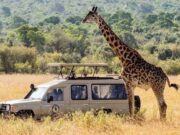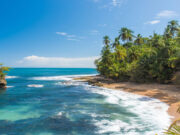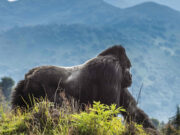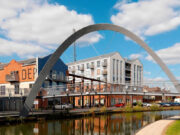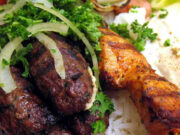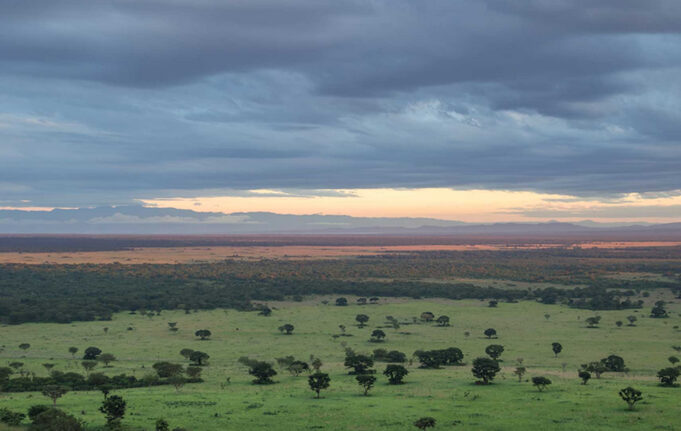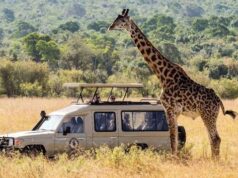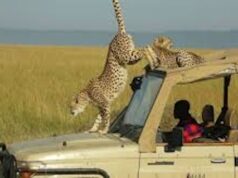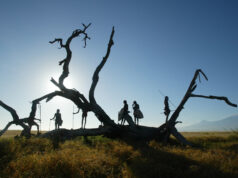The Lonely Planet proclaimed it the top destination in 2012, yet Uganda is still a hidden pearl, writes Geoff Power.
WITH a month in Uganda, we anticipated a wide variety of accommodations. We could not have predicted, however, that this would include everything from a borrowed tent at a campsite shared with a roving hippo, to the family home of one of Idi Amin’s former cabinet ministers.
This country, in central-east Africa, cannot boast the huge national parks of, say, Kenya, Tanzania or Botswana. Nonetheless, you will see the same large mammals, but in less-crowded reserves. Furthermore, with 1,000 species, Uganda is a bird-lovers’ paradise.
It is a hidden pearl, albeit one that the Lonely Planet proclaimed its top destination in 2012.
Yoweri Museveni has been Uganda’s president since 1986. He led the country out of a horrifically violent period. Seven years after the removal of Idi Amin, Museveni ushered in democratic rule, and a period of economic growth and stability followed.
However, despite the huge improvement in tourist facilities, the country remains an unstructured delight.
There are the unorthodox transport options: taxi drivers who will sit on passengers to squeeze an extra body in; busy-but-courteous bus companies that tear along rutted dust-roads; or hop-on and hazardous boda-bodas (so named because bikes used to smuggle goods from ‘border to border’).
The adventure begins in the capital, Kampala, where ramshackle streets are crammed with traffic and people. Your first road navigation turns into a spine-tingling joust. The corrugated stands and shelters around bus and taxi depots house everything from delicious, seasonal fruits to mannequins with enlarged rears (only in Africa could the question ‘does my bum look big in this?’ demand the answer ‘yes’).
We in the West try to control the environment; in Uganda, nature flows on past — you are another animal in a fragile kingdom. Our first night in Murchison Falls National Park made that very clear. Our guide was a hapless, loveable fellow called Achilles.
The Murchison Falls National Park is Uganda’s largest protected area. To reach the eponymous waterfall, take a three-hour boat trip past pods of snorting hippos and keenly-located crocs. Upstream, the Victorian Nile surges through a narrow cleft with thunderous rage. A further half-hour hike will see you at the top of this wonderful, rocky juncture.
Afterwards, Achilles took us to a deserted campsite on the northern bank. There, we collected firewood and put up a tent. We ate chappatis and omelettes at the rangers’ lodgings, where we were the only white people (‘muzungu’). It is impossible to go a day without eggs or bananas in Uganda.
When we returned, we had to shoo away a large hippo, grazing 10 metres from where we were to sleep. Once the fire was lit, though, we felt relatively safe in our flimsy, two-man tent.
Within half an hour, the wispy clouds above turned dark and heavy, and a shattering storm raged overhead. Each time the lighting trembled, our bodies were x-rayed against the tent’s fabric, and the torrential rain snuffed the life out of our protective fire.
We could hear panicked animals wandering past. We imagined the hippo returning and using the tent as a seat for his massive behind. We did not sleep well. We were still awake when the alarm went off at 6am. To compound matters, our vehicle got stuck in the rain-churned mud and we had to hitch a lift. Despite this, we got to see elephants, giraffes, an eagle-owl, and a cool-as-cucumber leopard lounging on a distant tree.
In 2012, revenue from tourism in Uganda rose to $805m, pushing agriculture into second place. From our camp, beside the Nile, however, we caught sight of the future: oil pylons. Achilles fears that ongoing exploration in the area will disturb wildlife. “I have a fear in mind the noise will harm animals so that they are not near the road when we drive tourists past.”
Every aspect of Ugandan society was shattered by Idi Amin’s brutal regime, yet its people are a joy: both warm and welcoming.
And, like the economy, the wildlife has made a remarkable recovery. Visitors have the opportunity to stand next to mountain gorillas, catch sight of prehistoric shoebills, sleep next to countless crater lakes, and climb Africa’s tallest mountain range.
Nonetheless, regional instability remains a concern. During our stay in the Fort Portal region, the Allied Democratic Forces overran a town in the nearby Democratic Republic of the Congo, causing a flood of refugees from that country to spill into Uganda.
Professor Edward Rugumayo lives in Fort Portal with his wife, Foibe, and one of their five grown-up children, Edgar. Rugumayo’s first foray into politics was with Idi Amin’s government, in 1971. The professor, made minister for education, resigned in 1973, when he realised what Amin was doing to his country. Rugumayo was forced into exile.
When we booked accommodation at the guest-house, Eriiba (meaning ‘Dove’), we had no idea that we were entering the home of such a prominent man. Sitting at the breakfast table proved a rousing experience. On the television set, there was a photo of Rugumayo with Nelson Mandela, from the professor’s time as Uganda’s ambassador to South Africa.
As mentor to Museveni, Rugumayo believes that a sensitive balance can be struck that sanctions oil development, yet preserves Uganda’s vital wildlife. He anticipates further investment in infrastructure, with a broad sweep of accommodation. “Big hotels do not benefit the ordinary people,” he says.
His son, Edgar, is contemplating a career in politics. “We are surrounded by hostile neighbours,” he says, grimly. “The only one not hostile is Tanzania. When your neighbour’s house catches fire, you are not going to be immune.”
During your stay, you will see your money directly benefiting locals. Strong eco-tourism credentials abound and there are many rewarding projects, such as the Bigodi Wetland Sanctuary, where you can see up to eight primate species, or guesthouses, such as Lake Mutanda Eco-Community Centre, with its stilted, lopsided cabins, managed by the wonderful and dexterous do-it-all, Deus.
Our highlight was a three-day hike in the Rwenzori Mountains. We stayed at the Rwenzori Unique Eco-Tourism Campsite, where we ate with Elisha Mutungwanda and family, of the Bakonjo tribe — expect drop-pit toilet, a watering-can shower, and stunning views across lush, forest valleys.
Everything served up to us during our stay was cultivated within 100m of Elisha’s home; the only items purchased were salt and cooking oil.
We ate African Black Nightshade, groundnut sauce, organic honey, tropical fruit, and prodigious amounts of matoke — a dish made with cooked banana. And we had fabulous herbal teas served to us.
We also had potatoes. In Uganda, they are commonly known as ‘Irish potatoes’; the missionaries introduced them to the region in the 19th century. If you are Irish and need to explain to Ugandans where Ireland is, don’t bother saying U2 or Roy Keane, just say “Irish — you know, like the potatoes”.
Geoff Power travelled with Turkish Airlines from Dublin to Entebbe, via Istanbul. Return flights with lastminute.com, €690
* Chimp tracking at Budongo Forest, in Murchison Falls National Park, at Kibale Forest National Park, or at Kyambura Gorge, in Queen Elizabeth National Park. See www.ugandawildlife.org for details.
* Hike the Rwenzori Mountains (right) with Kabarole Tours, a locally-run, eco-tourism tour and safari company ( www.kabaroletours.com ). Ph: + 256 4834 221 83, Mobile: + 256 774 057 390, or email: ktours@infocom.co.ug or rtooro@yahoo.com
* Explore the crater lakes around Fort Portal, also with Kabarole Tours.
* Water rafting in Jinja and, whilst there, find the source of the Nile — for more details, see Nile River Explorers on www.raftafrica.com
* Bigodi Wetland Sanctuary, a good example of conservation and tourism working at local level — see www.bigodi-tourism.org
* Do a walking safari at dawn, accompanied by a ranger, at Lake Mburo National Park — www.ugandawildlife.org for details.
* See abundant wildlife at close quarters along the Kazinga Channel, in Queen Elizabeth National Park — www.ugandawildlife.org for details.
To see/shop
* Nommo National Art Gallery, in a converted colonial residence on Victoria Street, Kampala
* ‘1000 Cups Coffee House’, Buganda Road, Kampala
* Crafts Market/Village, behind the National Theatre, Kampala
* Queen Elizabeth Bush Lodge ( www.naturelodges.biz , e: booking@naturelodges.biz ). The Bush Lodge is next to the Kazinga Channel but technically outside the boundaries of the Queen Elizabeth National Park. Consequently, you do not have to pay an additional park tariff to stay there.
* Arcadia Cottages, Lake Mburo National Park ( www.arcadiacottages.net )
* Eriiba Guesthouse, Fort Portal. A B&B with two rooms, ph: +256 777 635333, +256 772 451662
* RuwenZori View Guesthouse, Fort Portal ( www.ruwenzoriview.com )
* Rwenzori Unique Eco-Tourism Campsite, ph: +256 772 986235, e: elishamutungwanda@yahoo.com
* Lake Mutanda Eco-Community Centre ( www.lakemutandacamp.com ).


